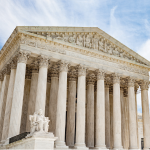The past few weeks have produced significant uncertainty in the U.S. political and legal systems in light of two recent Supreme Court decisions. Trump v. United States and Loper Bright Enterprises v. Raimondo have garnered substantial media attention and concern. One is more directly linked to regulatory advocacy, but both have significant implications for executive power and deserve some honest analysis.
We will begin with Trump v. United States, the Supreme Court’s decision on presidential immunity. Although this case may seem unrelated to health advocacy, it is probably the one most people have heard about. Additionally, its implications are linked to Loper Bright Enterprises v. Raimondo. The decision in Loper overturned Chevron deference, a four-decade-old standard for evaluating the rulemaking authority of administrative agencies. By exploring the nuances of these decisions, it becomes apparent that there are reasons to be concerned—but they may not be the reasons stressed in news reports.
Trump v. United States
This decision has received a great deal of media attention, with some news outlets and pundits going so far as to declare that this decision has made the president a king. This kind of hyperbole is great for clicks and viewership, but does it accurately describe the Supreme Court’s decision? I would argue that it emphatically does not. The decision carved out presidential immunity for actions the president makes when exercising his constitutional duties or during an official act of the president. Notably, it does not provide immunity for any other actions of the president. It also does not expand the powers of the presidency. The president is still limited to the legal and constitutional powers of the office.
This kind of immunity is not unprecedented. Members of Congress have long enjoyed immunity from prosecution for actions taken during legitimate legislative activity. This immunity has been extended to state and local legislators. Acts not related to the legislator’s duties or without lawful authority are not covered by legislative immunity. A somewhat comforting fact is that there is a long history of legislators from both parties being prosecuted for illegal acts, such as taking or soliciting bribes.
The decision in Trump v. United States does not foreclose the possibility of a president being prosecuted for acts before they have assumed office, after they have left office or for acts outside the scope of their constitutional or official duties. Despite what you may hear in the media, we do not have a king—at least, not yet.
Loper Bright Enterprises v. Raimondo
The Loper case began as a challenge to the National Marine Fisheries Service’s interpretation of a federal fishery law. Since 1984, administrative agencies have enjoyed deference from the Court when a statute’s language is ambiguous or if the statute is silent on an issue, provided the agency’s interpretation was reasonable and permissible. This legal doctrine originated in the case of Chevron U.S.A., Inc. v. Natural Resources Defense Council, Inc., and became known as Chevron deference.
For the past 40 years, agencies have interpreted statutes and promulgated rules knowing they would be given great deference by the courts. Loper has changed that. The decision in Loper holds that courts must “exercise independent judgment in determining the meaning of statutory provisions” and may not defer to an agency’s interpretation of an ambiguous statute.
There are tremendous legal implications for the Loper decision in the regulatory space. However, it is important to remember that there was a time before Chevron deference existed. Before Chevron, Congress explicitly delegated authority to administrative agencies. Healthcare laws that pre-date Chevron will likely not be significantly affected by the decision in Loper. Even the Affordable Care Act contains clear delegations of authority to administrative agencies. Although legal challenges may proliferate, the end result may not be drastically different, especially where there are clear statutory delegations of authority.
One final note on the end of Chevron and the Loper decision: Chevron deference ultimately made it easier for Congress to legislate. That has now changed. Laws will once again require clear delegations of authority. Congress could amend the Administrative Procedures Act and enshrine Chevron deference or another variation of deference into law. For now, though, the era of inattentive deferrals of authority is over.
Connecting the Dots
Both cases speak to presidential power and authority. It is easy to forget in the current hyperbolic debate surrounding these decisions that administrative agencies are under the authority of the executive branch. Although much of the media coverage around Trump v. United States has declared the presidency to be equivalent to a king, the Loper decision undercuts that narrative by curtailing the deference the executive branch has enjoyed in the rulemaking process. In the absence of Chevron deference or clear Congressional direction, the administrative agencies will have a much harder time simply filling gaps in legislation and policy. Essentially, we are left with a weakened executive branch, a stronger judicial branch and a formally established presidential immunity standard that had long been assumed.
We will continue to monitor legal developments around these decisions. As case law and legislation develop, this analysis may change. Rest assured that no matter the political environment, we will always try to give an honest and unbiased analysis of political and legal developments.
Joseph Cantrell, JD, is the director of state affairs and community relations for the ACR.


